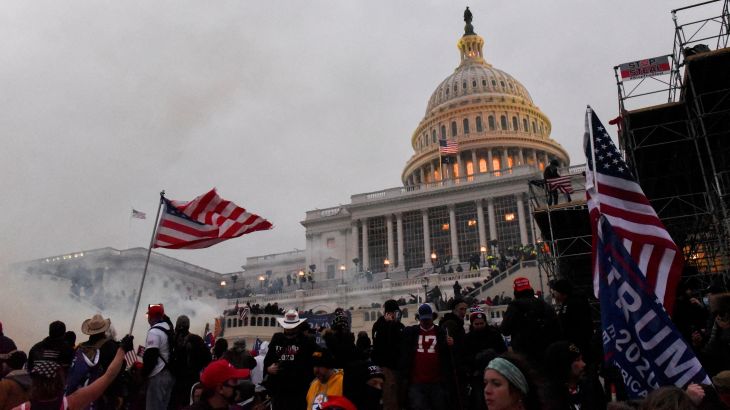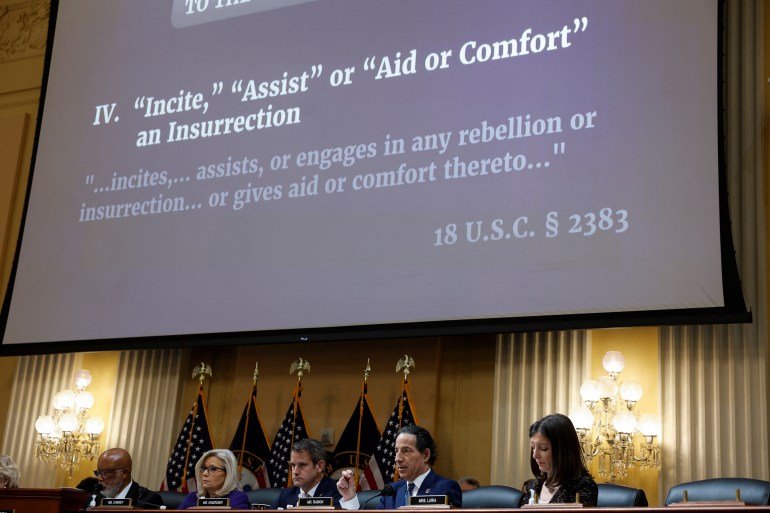January 6: What the criminal referrals against Donald Trump mean
Department of Justice will have the final say on whether to indict Trump on serious charges recommended by committee.

Washington, DC – For nearly two years, Democrats in the United States have described Donald Trump and far-right Republicans as “insurrectionists“. Now, the congressional panel investigating the January 6, 2021 attack on the Capitol has formally recommended insurrection charges against the former US president.
The Democratic-led committee revealed the criminal referrals on Monday as it outlined its case against Trump, accusing him of being behind the riot by stoking false election fraud claims and “summoning” his supporters to Washington, DC before they stormed the legislature.
Keep reading
list of 3 itemsTrump Organization found guilty in US tax fraud trial
White House slams Trump’s call for ‘termination’ of constitution
The panel voted unanimously to recommend four criminal charges against Trump, who is running for president in 2024, to the US legal system.
The recommendations are not legally binding, and it will be up to the Department of Justice whether to indict the ex-president, but the referrals mark the ultimate conclusion of the committee’s months-long investigation into the events of January 6. No former US president has ever been indicted on criminal charges.
A mob of Trump supporters breached and ransacked the Capitol that day in an effort to stop the certification of President Joe Biden’s victory after Trump and his allies had baselessly claimed that the 2020 election was “stolen”.
‘Significant’ evidence
Hundreds of accused rioters are facing criminal charges for entering the Capitol, and many have pleaded guilty. On Monday, Democratic Congressman Jamie Raskin outlined the panel’s recommendations, and stressed the need to prosecute the “masterminds” of the attack, not only people who participated.
“Ours is not a system of justice, where foot soldiers go to jail and the masterminds and ringleaders get a free pass,” he said.

Subodh Chandra, a civil rights lawyer and former federal prosecutor, said the Department of Justice will make its own determination when it comes to bringing charges.
“The [committee’s] report carries weight insofar that it summarises the nature of the evidence uncovered and highlights its significance,” Chandra told Al Jazeera. “But the opinions of the committee are not going to necessarily influence the Department of Justice, which will exercise its own independent judgement.”
He added that he does not expect prosecutors to give Trump any special treatment because he is running for president.
“The Department of Justice has every obligation to treat private citizen Trump just as it would any of the rest of us,” Chandra said. “He deserves all of the rights that the rest of us have, but no more – no special treatment.”
Trump has denied all wrongdoing and has continued to baselessly insist that widespread election fraud was behind his 2020 loss.
“These folks don’t get it that when they come after me, people who love freedom rally around me. It strengthens me. What doesn’t kill me makes me stronger,” the former president said in a statement in response to the panel’s recommendations. While some of Trump’s staunchest supporters have come to his defence, others in the Republican Party have remained quiet on the matter.
The recommended charges
The committee suggested these criminal referrals against Trump:
- Obstruction of an official proceeding
- Conspiracy to defraud the United States
- Conspiracy to make a false statement to the federal government
- Inciting, assisting or aiding insurrection
Below Al Jazeera unpacks the possible criminal charges and what they mean.
Obstruction of an official proceeding is a familiar charge to the Department of Justice when it comes to January 6. Hundreds of suspected participants in the attack have been indicted with this specific charge.
Raskin said the law makes it illegal “for anyone to corruptly, obstruct, influence or impede any official proceeding of the United States government”.
The January 6 riot aimed to disrupt a joint session of Congress that was certifying Biden’s win in the 2020 vote.
In its previous public hearings, the committee pushed to link Trump to the violence on January 6, highlighting his call for a protest in Washington weeks before the riots. “Big protest in D.C. on January 6th. Be there, will be wild!” the former president had written on Twitter on December 19, 2020.
Several witnesses also confirmed that Trump had wanted to join the demonstrators at the Capitol himself on January 6, but was prevented from doing so by Secret Service agents for security reasons.
Conspiracy to defraud the United States is an offence based on a broad law that makes it unlawful not only to cheat the US for material benefits but also to obstruct the functions of the government through dishonest means.
“The general purpose of this part of the statute is to protect governmental functions from frustration and distortion through deceptive practices,” the Justice Department says in its Criminal Resource Manual.
On Monday, Raskin said the committee is recommending the charge against Trump along with John Eastman, a lawyer involved in the effort to overturn the 2020 election, and others.
Conspiracy to make a false statement to the federal government is a charge based on the violation of a law that makes it a crime to “knowingly and willfully” make “materially false, fictitious, or fraudulent statement or representation” to US government agencies.
As it relates to Trump, Raskin explained on Monday that the charge stems from Trump’s efforts to advance slates of “fake electors” from states won by Biden to reverse the results of the 2020 vote.
The committee had previously said that Trump and his allies drafted alternative slates of electors from swing states for then-Vice President Mike Pence to use to halt the transfer of power in his ceremonial role of certifying the vote.
Pence refused to go along with that plan.
“The evidence clearly suggests that President Trump conspired with others to submit slates of fake electors to Congress and the National Archives,” Raskin said on Monday.
“We believe that this evidence we set forth in our report is more than sufficient for a criminal referral of former President Donald J Trump and others in connection with this offence.”
Inciting, assisting or aiding insurrection is the most serious referral the committee is making against Trump.
Insurrection simply means rebellion against the government.
“Whoever incites, sets on foot, assists, or engages in any rebellion or insurrection against the authority of the United States or the laws thereof, or gives aid or comfort thereto, shall be fined under this title or imprisoned not more than ten years, or both; and shall be incapable of holding any office under the United States,” the law reads.
On Monday, Raskin said the panel has amassed “more than sufficient evidence” that Trump aided and comforted the January 6 rioters and aimed to disrupt the peaceful transfer of power.
He added that Insurrection is “a grave Federal offence, anchored in the Constitution itself, which repeatedly opposes insurrections and domestic violence”.
‘Trail of incrimination’
Chandra, the lawyer, said that, based on the evidence presented by the committee, the referral for the charge regarding insurrection is appropriate.
“Donald Trump fomented insurrection against the government of the United States and against the peaceful transition of power under our Constitution,” he told Al Jazeera.
“The evidence is quite damning. And our government is a government of laws, and not of individual people. If he violated the law, he should be held account held to account just like everyone else would be.”
A criminal case against Trump would be unprecedented. No other former US president has faced criminal charges. Also, none of the January 6 accused rioters has been charged with insurrection, although members of the Proud Boys far-right group are on trial for sedition accusations.
Chandra stressed that complex investigations take time to carry out properly, which he said can be frustrating to the public.
“At the end of the day, though, the evidence can be stripped down to show what Donald Trump knew, when he knew it, what he did, what he said,” Chandra added. “And because he’s incapable of shutting his mouth, he’s left a stinky trail of incrimination behind him.”